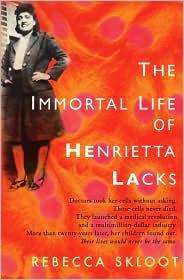Review of 'The Immortal life of Henrietta Lacks' on 'Goodreads'
1 star
this book is apparently inaccurate

Hardcover, 369 pages
English language
Published Nov. 7, 2009 by Crown Publishers.
Her name was Henrietta Lacks, but scientists know her as HeLa. She was a poor black tobacco farmer whose cells—taken without her knowledge in 1951—became one of the most important tools in medicine, vital for developing the polio vaccine, cloning, gene mapping, in vitro fertilization, and more. Henrietta’s cells have been bought and sold by the billions, yet she remains virtually unknown, and her family can’t afford health insurance.
This New York Times bestseller takes readers on an extraordinary journey, from the “colored” ward of Johns Hopkins Hospital in the 1950s to stark white laboratories with freezers filled with HeLa cells, from Henrietta’s small, dying hometown of Clover, Virginia, to East Baltimore today, where her children and grandchildren live and struggle with the legacy of her cells. The Immortal Life of Henrietta Lacks tells a riveting story of the collision between ethics, race, and medicine; of scientific discovery and …
Her name was Henrietta Lacks, but scientists know her as HeLa. She was a poor black tobacco farmer whose cells—taken without her knowledge in 1951—became one of the most important tools in medicine, vital for developing the polio vaccine, cloning, gene mapping, in vitro fertilization, and more. Henrietta’s cells have been bought and sold by the billions, yet she remains virtually unknown, and her family can’t afford health insurance.
This New York Times bestseller takes readers on an extraordinary journey, from the “colored” ward of Johns Hopkins Hospital in the 1950s to stark white laboratories with freezers filled with HeLa cells, from Henrietta’s small, dying hometown of Clover, Virginia, to East Baltimore today, where her children and grandchildren live and struggle with the legacy of her cells. The Immortal Life of Henrietta Lacks tells a riveting story of the collision between ethics, race, and medicine; of scientific discovery and faith healing; and of a daughter consumed with questions about the mother she never knew. It’s a story inextricably connected to the dark history of experimentation on African Americans, the birth of bioethics, and the legal battles over whether we control the stuff we’re made of. ([source][1])
this book is apparently inaccurate
very, very well written. the transition between science and personal life of not only henrietta but her family members as well was very smooth. the only thing was i kinda got whiplash from the afterword because it went straight into super technical stuff. i guess it is only an afterword though. very good book, and i recommend it to everybody, but especially people who are involved in molecular biology.
The topic is fascinating. If only the author could confine herself to the topic of medical ethics and stay there, not to bring out a completely unrelated family drama.
A fascinating book about the history of the woman from whom HeLa cells are descended, the lives of her family and the ways in which the two stories have intertwined. I took a long time to get round to reading this, struggling to see how an entire book on the topic could be interesting. However, Skloot does a great job of drawing the characters of each of Lacks' family members and empathising with their position in understanding and gaining identity from their ancestor's unwitting role in modern medicine and human biology. A proper page-turner too!
A fascinating book about the history of the woman from whom HeLa cells are descended, the lives of her family and the ways in which the two stories have intertwined. I took a long time to get round to reading this, struggling to see how an entire book on the topic could be interesting. However, Skloot does a great job of drawing the characters of each of Lacks' family members and empathising with their position in understanding and gaining identity from their ancestor's unwitting role in modern medicine and human biology. A proper page-turner too!
Immortal Life is an excellent study of the human faces behind the world of bioresearch and patent research using human genes. Rebecca Skloot traces the history of He-La, the cells that will not die, and becomes part of the world of the family Henrietta left behind. Her meticulous research reveals the injustice of the segregated wards of John Hopkins and the motivations of early cell researchers who sought not personal profit but scientific advancement. The book raises important questions about who should gain from these bio products and how a market in human genetics can inhibit as well as encourage science. The singular achievement of Skloot's work, though, is the portrait of the Lacks family as she breaches the barriers of their anger and gains their trust. Immortal Life is as much a study of how our society has treated those who are powerless as it is a treatise on …
Immortal Life is an excellent study of the human faces behind the world of bioresearch and patent research using human genes. Rebecca Skloot traces the history of He-La, the cells that will not die, and becomes part of the world of the family Henrietta left behind. Her meticulous research reveals the injustice of the segregated wards of John Hopkins and the motivations of early cell researchers who sought not personal profit but scientific advancement. The book raises important questions about who should gain from these bio products and how a market in human genetics can inhibit as well as encourage science. The singular achievement of Skloot's work, though, is the portrait of the Lacks family as she breaches the barriers of their anger and gains their trust. Immortal Life is as much a study of how our society has treated those who are powerless as it is a treatise on a perpetually-multiplying cluster of cells.




